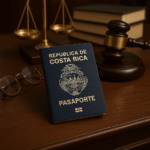Does Costa Rica Permanent Residency Expire? Our Insights
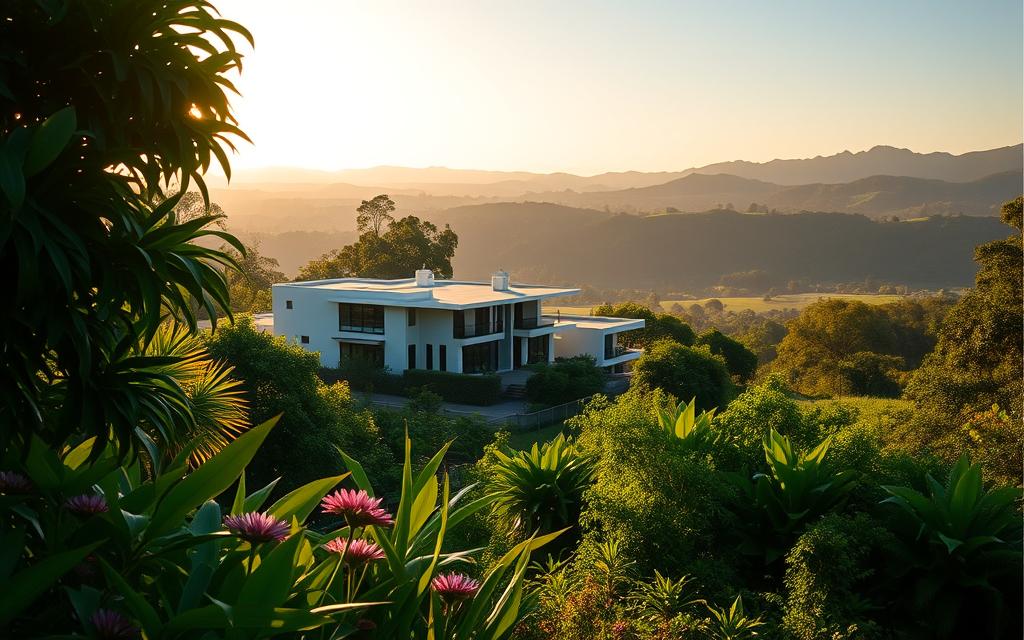
Residency in Costa Rica has become an attractive option for individuals and families seeking a better quality of life. This Central American country, known for its natural beauty and rich culture, has become a desirable destination for those wishing to settle.
While permanent residency suggests an indefinite status, there are renewal requirements that residents must adhere to. The DIMEX card, a crucial document for Costa Rican residents, needs to be renewed every 2-5 years. Without a valid DIMEX card, daily tasks become challenging.
We will explore whether Costa Rica residency expires and what this means for expatriates. Understanding the validity periods and the renewal process is essential for maintaining legal standing in Costa Rica.
Understanding Costa Rica Residency Options
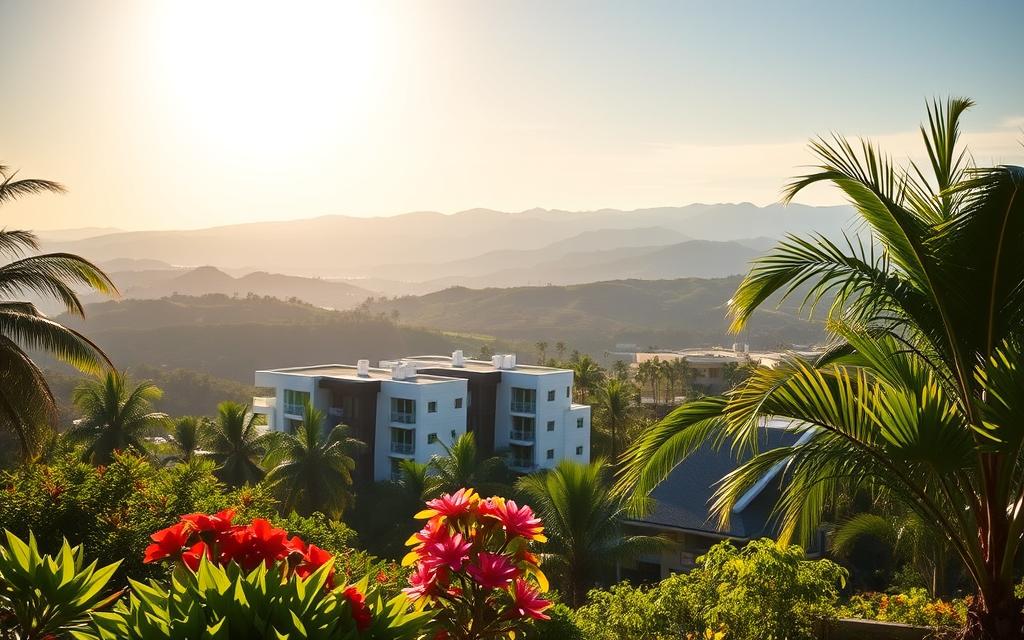
Costa Rica offers a diverse range of residency options tailored to the unique needs of applicants. The country's residency program is designed to accommodate various lifestyles and financial situations, making it an attractive destination for foreigners.
Costa Rica provides several types of residency, including temporary and permanent options. Temporary residency is typically granted for up to two years and can be renewed. This category applies to various individuals, such as retirees, workers, investors, students, volunteers, teachers, and researchers.
Types of Residency Available
Among the most common residency options are Rentista residency, designed for those with stable and sufficient income; Investment residency, for those who wish to contribute to the country's development through business investment; and Permanent residency, which allows foreigners to live indefinitely in Costa Rica after meeting specific requirements. For more information on how to get residency in Costa Rica, you can visit https://www.jaroscr.com/how-to-get-residency-in-costa-rica/.
Differences Between Temporary and Permanent Residency
Temporary residency permits in Costa Rica are typically valid for 1-2 years and serve as a pathway to permanent residency after maintaining temporary status for a specified period. Permanent residency, on the other hand, offers more stability and fewer renewal requirements, although it still necessitates periodic documentation updates to maintain legal status and benefits.
Validity Periods for Permanent Residency
Permanent residency status in Costa Rica does not technically expire. However, the DIMEX card, which serves as proof of this status, requires regular renewal. Initially, the DIMEX card is valid for two years, but subsequent renewals can extend its validity to three years. This means that while your permanent residency status remains valid indefinitely, your DIMEX card needs to be renewed every two to three years.
DIMEX Card Renewal Requirements
It's essential to understand the renewal process for your DIMEX card. You can start renewing your card up to three months before it expires. If you miss the deadline, you have a three-month grace period, after which you'll need to seek legal assistance to explain the delay. For more information on the renewal process, you can visit https://www.jaroscr.com/dimex-costa-rica/. The renewal process is relatively straightforward, requiring fewer documents and less processing time compared to the initial application.
Renewal Timeframes for Different Residency Categories
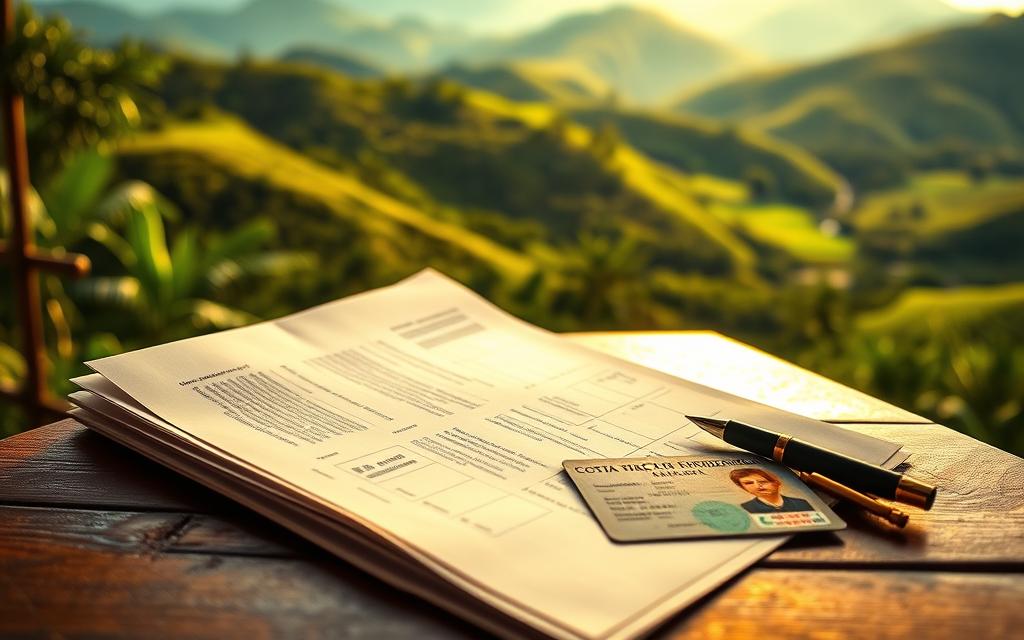
Understanding the renewal timeframes for different residency categories is crucial for maintaining legal status in Costa Rica. Various residency categories have specific renewal requirements, and being aware of these can help you prepare adequately.
Pensionado (Retiree) Residency Renewal
Pensionado residency requires renewal every two years. Applicants must demonstrate a minimum monthly pension income of $1,000. This category is ideal for retirees who have a stable pension income.
Investor Residency Renewal
Investor residency also requires renewal every two years. To qualify, individuals must have invested at least $200,000 in a Costa Rican business or property. This investment must be maintained throughout the residency period.
Rentista Residency Renewal
Rentista residency holders must renew their status every two years. They are required to prove a minimum monthly unearned income of $2,500. This category is suitable for individuals with a stable income from sources other than employment.
Each residency category has its unique requirements, and understanding these is key to a smooth renewal process. By knowing what to expect, you can ensure that you maintain your legal status in Costa Rica without interruption.
The Permanent Residency Renewal Process
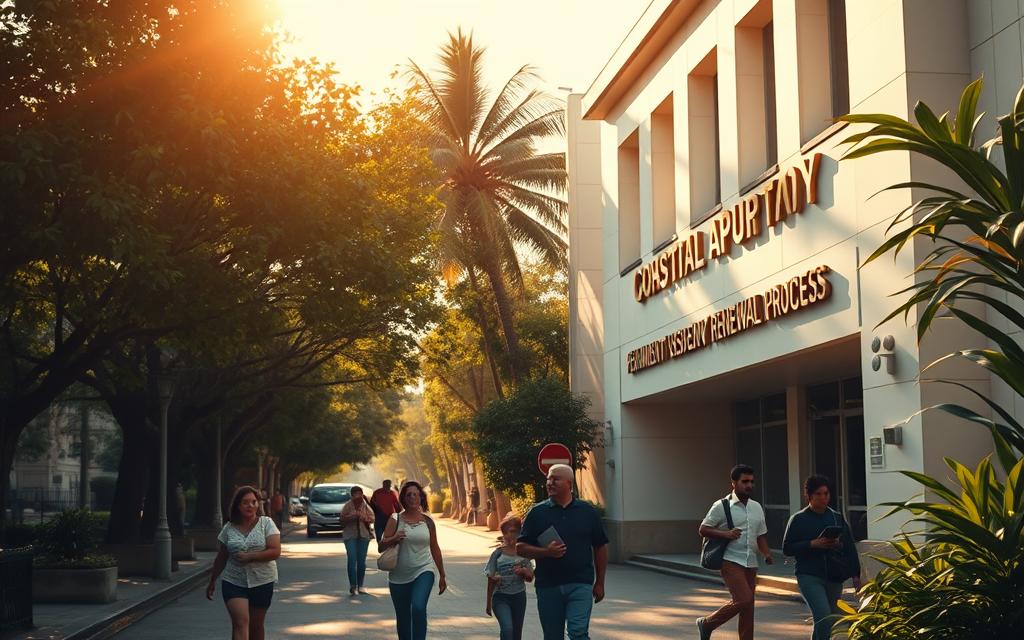
Renewing your permanent residency in Costa Rica is a straightforward process that requires some essential documents and a few simple steps. The renewal process is crucial for maintaining your status in the country, and we're here to guide you through it.
Required Documents for Renewal
To renew your permanent residency, you'll need to gather a few key documents. These include your original DIMEX card that is expiring or has expired in the last three months, proof of your most recent payment in the CCSS (Caja) system, and a signed letter declaring your identity and the full names of both your parents. It's essential to verify your status in the Validacion de Derechos system to ensure you're registered as active and covered in the Costa Rican social security system. For more information on the requirements, you can visit related residency information.
Step-by-Step Application Procedure
The renewal process involves several stages. First, you'll need to make an appointment at either the Banco de Costa Rica (BCR) or Correos de Costa Rica. Then, bring all required documents, pay the necessary fees, and have your picture taken. After completing these steps, you'll receive a voucher, known as a Comprobante de Solicitud, which you'll use while waiting for your new DIMEX card to be processed and delivered. Understanding the timeline for each step will help you plan accordingly and avoid any gaps in your documentation status.
Renewing at Banco de Costa Rica (BCR)
Renewing at Banco de Costa Rica (BCR) is a popular option due to its efficiency. To renew at BCR, you can make an appointment online through the BCR Citas website or by calling 800-BCRCITA (227-2482). Not all BCR branches offer immigration services, so it's essential to check beforehand. This method is known for being more organized, making the renewal process smoother.
Renewing at Correos de Costa Rica (Post Office)
Another option for renewing your permanent residency is at Correos de Costa Rica, the national post office. The process here is somewhat similar to BCR, involving making an appointment. However, you may need to deposit some fees into a specific BCR account before your appointment. It's crucial to check the specific requirements for Correos de Costa Rica to ensure a hassle-free renewal experience.
For individuals over 65, there's a convenient option to renew directly at Migracion in La Uruca, San Jose, on Thursdays and Fridays without an appointment, receiving a new DIMEX card the same day.
Costs and Fees Associated with Residency Renewal
To maintain your legal status in Costa Rica, it's essential to comprehend the costs involved in residency renewal. The process involves several financial obligations that you need to be aware of to budget accordingly.
Breakdown of Official Fees
The official fees for renewing your permanent residency in Costa Rica include several components. The primary fee is the renewal solicitation fee, charged by Migration, which is approximately $125. Additionally, there's a shipping cost of about $10 to have your new DIMEX card delivered to your nearest Correos de Costa Rica. There's also an administrative commission of around $15. In total, the official fees amount to approximately $150 per person. It's crucial to note that these fees cannot be paid by credit card; you must either withdraw the money from your Banco de Costa Rica (BCR) account or pay in cash.
Additional Expenses to Consider
Beyond the official fees, there are additional expenses to consider during the renewal process. You may incur transportation costs to and from appointments, which can vary depending on your location within Costa Rica. For those who require assistance, there may be costs associated with translation services or legal advice. For families renewing multiple residency cards, the costs can multiply, although some service providers may offer package deals that provide economies of scale. For more detailed information on the renewal process, you can visit this resource on applying for Costa Rica Pensionado Residency.
Understanding these costs and fees is vital for planning and ensuring that you can maintain your legal status in Costa Rica without unexpected financial burdens.
Time Limits for Being Outside Costa Rica
The duration you can spend outside Costa Rica without affecting your residency status is a critical aspect to consider. As a permanent resident, understanding these time limits is essential to maintain your status.
Maximum Absence Periods for Permanent Residents
Permanent residents in Costa Rica can stay outside the country for up to two years without jeopardizing their residency status. This flexibility allows residents to travel or live abroad for extended periods while maintaining their status in Costa Rica.
Consequences of Exceeding Time Limits
Exceeding the allowable time limits can lead to the cancellation of your residency status, requiring you to restart the entire immigration process. It's crucial to manage extended absences carefully and stay compliant with Costa Rican immigration laws.
To avoid issues, residents should track their time outside the country and maintain documentation regarding their entries and exits. Understanding these rules helps residents plan their stays abroad without risking their residency status in Costa Rica.
Common Challenges and How to Overcome Them
Costa Rica's residency renewal process, while straightforward in theory, can present several challenges that need to be addressed. We will explore these common issues and provide practical solutions based on real experiences.
Dealing with Expired Residency
If you miss the renewal deadline, you can still renew your residency up to three months after expiration. After this grace period, a lawyer's letter explaining the delay is required. Without a valid DIMEX card, daily life can become complicated, affecting banking, service applications, and even the cost of visiting national parks. For instance, you might face higher non-resident prices at attractions. To avoid such issues, timely renewal is crucial.
Navigating the Costa Rican Bureaucracy
The Costa Rican bureaucracy can be complex, particularly when proving social security (Caja) coverage, a requirement for renewal. Those insured under their spouse's account may need to periodically renew their dependent status at local CCSS offices. Additionally, documentation such as an apostilled marriage certificate may be necessary to prove marital status. Understanding these requirements can help in anticipating and overcoming potential hurdles.
Conclusion
In conclusion, understanding the nuances of Costa Rica's permanent residency is crucial for a seamless experience in this beautiful country. We've comprehensively addressed the question of whether Costa Rica permanent residency expires, clarifying that while the status itself is permanent, the documentation requires regular renewal.
The renewal process varies by residency type, with different timeframes and documentation needed depending on whether you hold Pensionado, Investor, Rentista, or other categories of residency permits. Being aware of the time limits for absences from Costa Rica is also crucial, as permanent residents are allowed up to two years outside the country.
For those seeking assistance with their residency renewal or application, professional services are available through JAROS CR (www.jaroscr.com, info@jaroscr.com, +(506)7182-8969). With the information provided in this guide, you should be well-equipped to navigate the renewal process successfully and maintain your permanent residency in Costa Rica for years to come, enjoying all the benefits that come with it.

